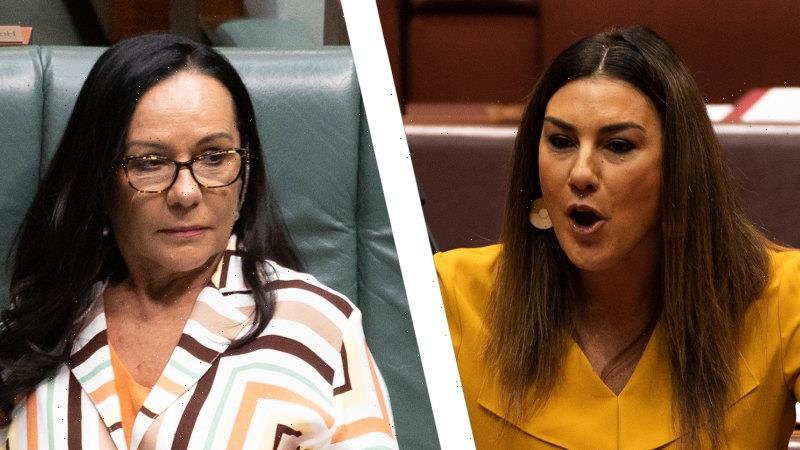Senators Lidia Thorpe and Pauline Hanson grilled Indigenous Affairs Minister Linda Burney in a private referendum meeting on Thursday ahead of a crucial month for the campaign to create a Voice to parliament.
The One Nation and former Greens senators were joined by independent senator David Pocock at a meeting of the powerful referendum working group, which is finalising its recommendation on the words Australians will be asked in a referendum and the lines that will be added to the constitution.
Lidia Thorpe used the meeting to ask Linda Burney about the impact the Voice to parliament would have on First Nations sovereignty.Credit:Rhett Wyman/Alex Ellinghausen
The group did not make a final decision on whether to accept a compromise wording of the constitutional alteration proposed by Attorney-General Mark Dreyfus, which some Voice proponents believe will help win conservative votes and foster greater bipartisanship.
However, the vast majority of working group members oppose the change and believe it could weaken the Voice, raising the possibility the federal cabinet could pursue the compromise wording against the wishes of Indigenous leaders. Cabinet, which is not bound to follow the advice of the working group, is expected to make the call within the next fortnight.
Senior Voice leaders including respected academic Marcia Langton will descend on the nation’s capital next week to support the referendum machinery bill, which sets up the architecture to run the referendum to be held later this year. The Coalition has raised issues about elements of the bill and its support is not secured.
While there have been months of speculation about the constitutional amendment wording, this masthead has confirmed there has also been debate over the words that citizens will be asked on the ballot paper.
Some Indigenous leaders have pushed back against referencing “recognition” in the referendum question because they associate the term with the previous failed recognition campaigns led by Coalition governments, multiple sources said.
Thorpe finally had the chance to ask Voice leaders and Burney about her main concern regarding the Voice: the prospect, denied by Indigenous leaders and experts, that agreeing to the Voice would cede First Nations sovereignty.
Hanson and two working group members, who spoke anonymously because the meetings are confidential, said Thorpe sharply questioned Burney about sovereignty, an issue she has raised for months amid her negative remarks on the Voice.
“Thorpe just went on and on and on about sovereignty. She was very authoritative and wanted an answer from Burney, who was trying to palm off the question to somebody else,” Hanson said after the meeting.
The legal expert group advising the government has flatly rejected the concerns about sovereignty.
Senator Pauline Hanson said she asked Burney and Dreyfus a series of questions about the Voice’s model.Credit:Rhett Wyman
Hanson, who strongly opposes the Voice, said she asked Burney and Dreyfus a series of questions about the Voice’s model and how the constitution would be amended.
Hanson said government representatives informed members of the meeting that the amendment would exist in a new chapter of the constitution, being chapter nine.
“I thought Burney was completely out of her depth. She wasn’t able to answer questions and wanted to hand over to Mark Dreyfus,” Hanson said.
Multiple members of the group, whose members are bound by confidentiality rules, attacked Hanson and Thorpe, saying neither of them understood constitutional law.
“Their lack of knowledge is gobsmacking,” one said. “They clearly don’t understand the purpose of the referendum or constitutional law.”
“Lidia’s performance was to be expected. It was hysterical,” another person familiar with the meeting said.
Thorpe’s office did not respond to questions about the meeting.
A communique from the working group confirmed it held discussions about the referendum wording, which will also be debated in a parliamentary inquiry over coming months.
The group also heard from South Australia’s Attorney-General and Aboriginal Affairs Minister Kyam Maher about the South Australian Indigenous Voice that was recently legislated.
Pocock, who supports the Voice, said he was impressed at the deep thought being given by the working group to deciding the draft amendment.
Langton, who said she could not discuss what happened in Thursday’s meeting, said she and other senior Voice proponents would attend parliament in Canberra next week in support of the referendum machinery bill, which will be followed later this month by another bill containing the wording that will be included in the constitution.
“We’re confident it will get through the parliament. That will be a big first step in this process,” Langton said after the meeting.
The referendum engagement group will meet on Friday in Adelaide and Voice leaders will hold a press conference.
Cut through the noise of federal politics with news, views and expert analysis from Jacqueline Maley. Subscribers can sign up to our weekly Inside Politics newsletter here.
Most Viewed in Politics
From our partners
Source: Read Full Article


